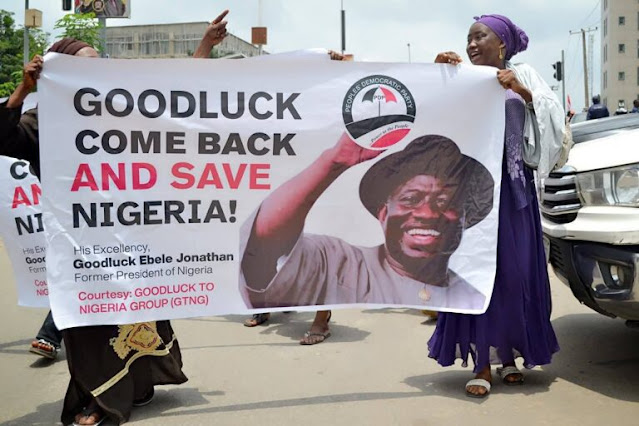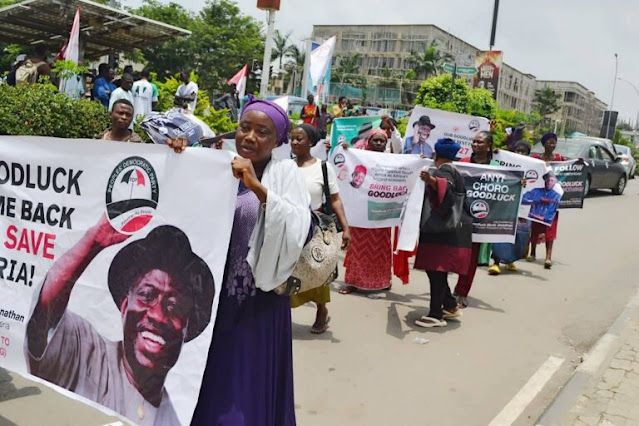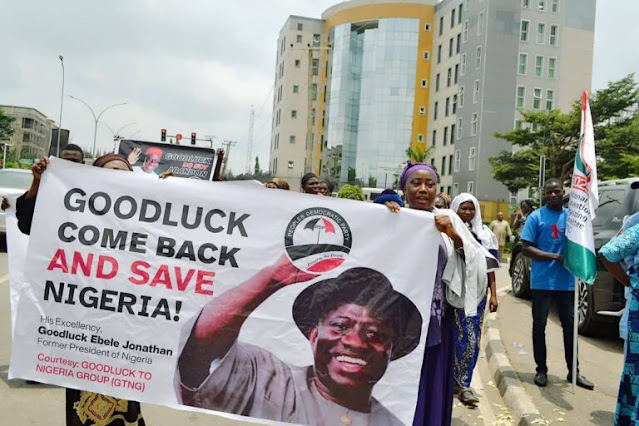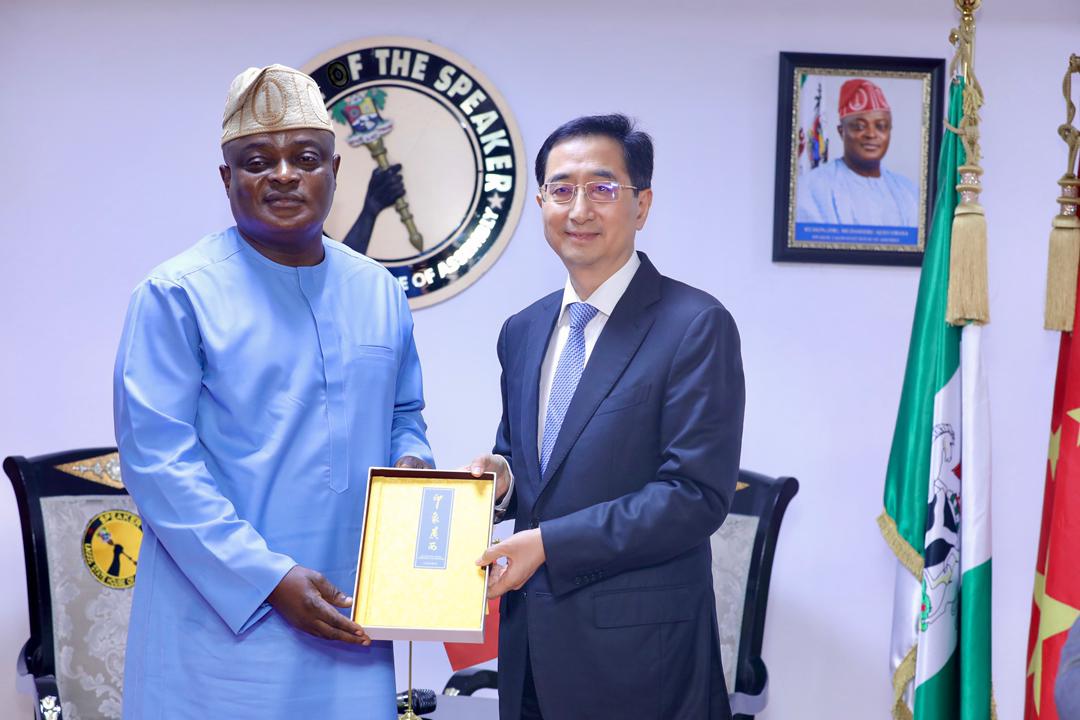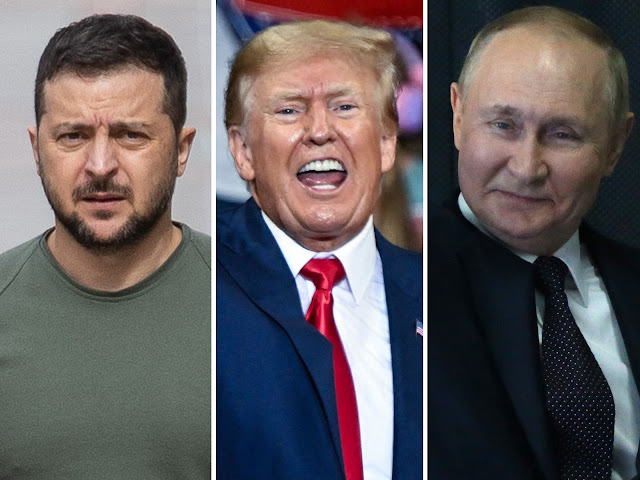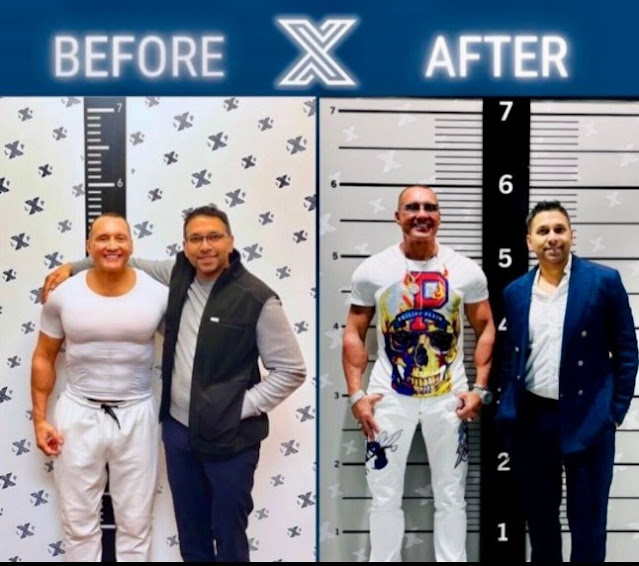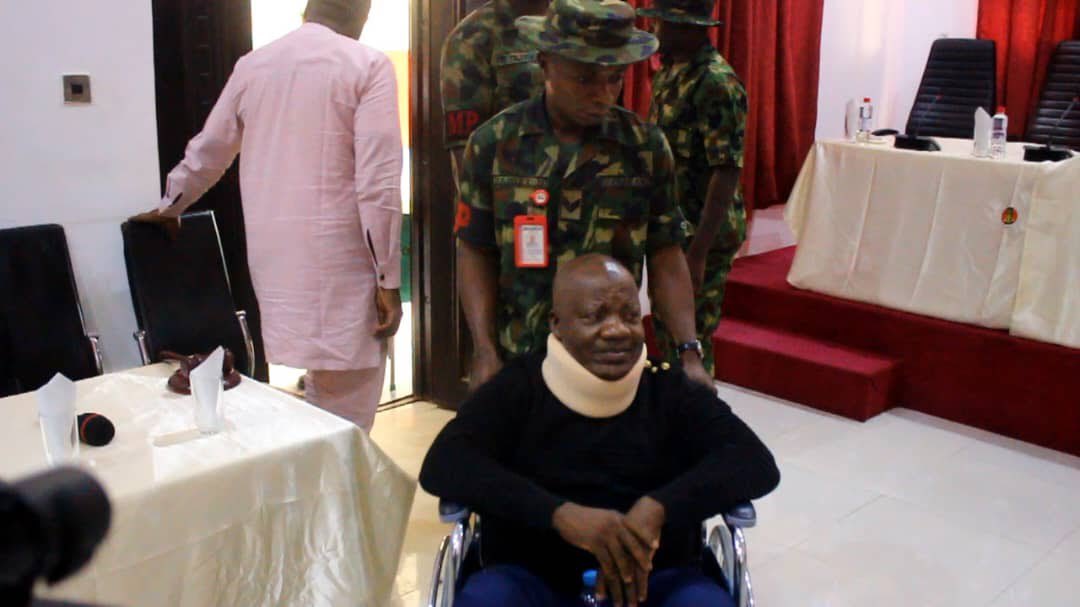On Monday, August 25, 2025, the national headquarters of the Peoples Democratic Party (PDP) in Abuja became the epicenter of fervent political activity as hundreds of demonstrators gathered to demand that former President Goodluck Ebele Jonathan declare his candidacy for the 2027 presidential election. The protesters, a diverse group of Nigerians from various walks of life, filled the streets around the PDP secretariat, brandishing colorful banners and chanting slogans that echoed their call for Jonathan to return to the political stage and lead the nation once again. The demonstration, marked by passion and determination, underscores the enduring popularity of the former president and highlights the complex dynamics of Nigeria’s political landscape as the 2027 election approaches.
A Show of Support for Jonathan
The rally was a vibrant display of grassroots support for Goodluck Jonathan, who served as Nigeria’s president from 2010 to 2015. The demonstrators, many of whom traveled from different parts of the country, expressed their belief that Jonathan’s leadership experience and reputation for humility make him the ideal candidate to address Nigeria’s current challenges. Banners with messages such as “GEJ for 2027,” “Jonathan, Our Hope for a Better Nigeria,” and “Come Back, Goodluck!” were prominently displayed, while chants of “We want Jonathan!” reverberated through the crowd, drawing attention from passersby and the media.
The protesters, comprising youth groups, women’s organizations, and PDP loyalists, voiced their frustration with the current state of the nation, citing issues such as economic hardship, insecurity, and unemployment. They argued that Jonathan’s previous tenure was marked by relative stability and progressive policies, particularly in agriculture, education, and infrastructure. Many pointed to his handling of the 2014 Ebola crisis and his peaceful concession of power in 2015 as evidence of his statesmanship and commitment to Nigeria’s unity.
One of the rally’s organizers, Comrade Ahmed Yusuf, a youth leader from Kaduna, addressed the crowd, emphasizing Jonathan’s track record as a unifying figure. “Goodluck Jonathan is a man of peace, a leader who understands the needs of Nigerians. He brought development to our country before, and we believe he can do it again,” Yusuf declared. He urged the former president to heed the people’s call and contest the 2027 election under the PDP platform, arguing that Jonathan’s leadership could restore hope and stability to the nation.
Jonathan’s Political Legacy
Goodluck Jonathan, a former governor of Bayelsa State, rose to national prominence when he became vice president in 2007 under President Umaru Musa Yar’Adua. Following Yar’Adua’s death in 2010, Jonathan assumed the presidency, serving first as acting president and later as the elected president from 2011 to 2015. His administration was credited with significant achievements, including the agricultural transformation agenda, which boosted local food production, and the establishment of new federal universities to expand access to education. However, his tenure was also marked by challenges, including rising insecurity due to Boko Haram’s insurgency and allegations of corruption within his government.
Jonathan’s decision to concede defeat to Muhammadu Buhari in the 2015 presidential election earned him widespread respect both domestically and internationally. His peaceful handover of power, a rarity in African politics at the time, was hailed as a defining moment for Nigeria’s democracy. Since leaving office, Jonathan has remained active in international diplomacy, serving as a mediator in regional conflicts and earning a reputation as a global advocate for peace and democracy.
The call for Jonathan to return to the presidency reflects a nostalgia for his leadership style, which many describe as inclusive and conciliatory. Supporters argue that his experience navigating Nigeria’s complex ethnic and religious diversity makes him uniquely qualified to address the country’s current challenges. However, his potential candidacy also raises questions about the constitutional and political implications of a former president seeking another term, given Nigeria’s constitutional provisions and the PDP’s internal dynamics.
Constitutional and Political Context
The Nigerian Constitution allows a president to serve a maximum of two four-year terms, whether consecutive or non-consecutive. Jonathan served one full term from 2011 to 2015 and part of a term from 2010 to 2011 following Yar’Adua’s death. Legal experts are divided on whether he is eligible to run again, with some arguing that his partial term counts toward the two-term limit, while others contend that he is constitutionally eligible for one more term. The ambiguity surrounding this issue has sparked debates, but it has not dampened the enthusiasm of his supporters.
Politically, the rally at the PDP headquarters signals a potential shift within the party as it prepares for the 2027 election. The PDP, which lost power to the All Progressives Congress (APC) in 2015, has been working to reposition itself as a viable alternative to the ruling party. The call for Jonathan to run suggests that some party members see him as a unifying figure capable of rallying the PDP’s base and attracting voters disillusioned with the APC’s performance. However, the party’s leadership has yet to formally endorse any candidate, and Jonathan himself has not publicly declared his intention to run.
The demonstration also highlights the broader political dynamics in Nigeria, where personality-driven politics often overshadow ideological debates. Jonathan’s supporters view him as a candidate who transcends regional and ethnic divides, but his candidacy could face opposition from within the PDP, particularly from younger leaders who may argue for fresh faces to lead the party into the future. Additionally, the APC, which remains a formidable force, is likely to field a strong candidate, making the 2027 election a highly competitive contest.
Voices from the Rally
The rally drew a diverse crowd, including students, traders, civil society activists, and PDP members. Many expressed personal reasons for supporting Jonathan’s potential candidacy. Aisha Mohammed, a trader from Lagos, said, “During Jonathan’s time, things were not perfect, but we had hope. The economy was better, and we felt safer. We need him back to fix what is broken.” Similarly, Chukwuma Okeke, a university student from Enugu, praised Jonathan’s focus on education. “He built new universities and gave scholarships to students. We need a leader who cares about young people,” he said.
Women were particularly vocal at the rally, with several groups highlighting Jonathan’s efforts to promote gender equality during his presidency. Mrs. Fatima Ibrahim, a member of a women’s cooperative in Kano, noted that Jonathan’s administration introduced programs to empower women economically. “He gave us opportunities to grow our businesses and take care of our families. We want him back because he understands our struggles,” she said.
The rally was largely peaceful, with security personnel deployed to ensure order. The demonstrators marched in an organized manner, singing solidarity songs and waving placards. PDP officials at the headquarters acknowledged the protesters’ demands but did not make any official statements regarding Jonathan’s candidacy. The event was widely covered by the media, amplifying the protesters’ message and sparking discussions about Jonathan’s potential return to politics.
Implications for 2027 and Beyond
The rally at the PDP headquarters has significant implications for Nigeria’s political landscape as the 2027 election approaches. For the PDP, the demonstration underscores the need to engage with its grassroots base and address the concerns of ordinary Nigerians. The party’s ability to capitalize on the momentum generated by the rally will depend on its leadership’s willingness to rally behind a candidate who can unify its diverse factions and appeal to a broad electorate.
For Goodluck Jonathan, the rally represents both an opportunity and a challenge. While the outpouring of support highlights his enduring popularity, it also places pressure on him to make a definitive decision about his political future. If he chooses to run, he will need to navigate the legal and political complexities of a second term while building a coalition strong enough to challenge the APC. If he declines, his supporters may feel disillusioned, potentially weakening the PDP’s chances in 2027.
The rally also reflects broader trends in Nigerian politics, where citizens are increasingly vocal about their expectations for leadership and governance. The issues raised by the demonstrators—economic hardship, insecurity, and unemployment—are central to Nigeria’s challenges and will likely dominate the 2027 election campaign. The PDP, APC, and other political parties will need to articulate clear and compelling visions to address these concerns if they hope to win the trust of voters.
Conclusion
The gathering of hundreds of demonstrators at the PDP headquarters on August 25, 2025, calling for Goodluck Jonathan to run for president in 2027, is a powerful reminder of the former president’s enduring influence in Nigerian politics. The rally, characterized by passionate chants and evocative banners, reflects the hopes of many Nigerians for a return to the stability and progress they associate with Jonathan’s presidency. While his potential candidacy raises constitutional and political questions, it also highlights the PDP’s opportunity to leverage his popularity to strengthen its position ahead of the 2027 election.
As Nigeria navigates a complex and challenging political landscape, the voices of the demonstrators serve as a call to action for political leaders to address the pressing issues facing the nation. Whether Jonathan heeds the call to run remains to be seen, but the rally has undoubtedly reignited discussions about his legacy and the future of Nigeria’s democracy. As the 2027 election draws closer, the PDP and other stakeholders will need to harness this grassroots energy to build a united and forward-looking campaign that resonates with the aspirations of millions of Nigerians.


